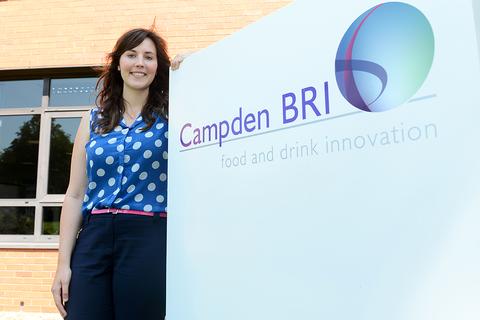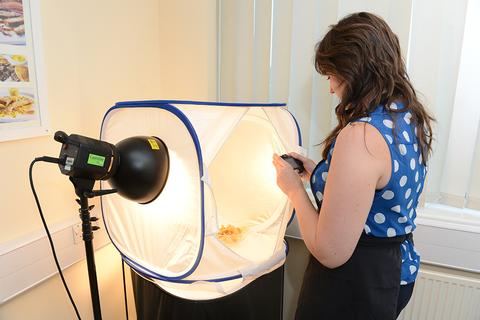Lydia Sackett



I am a… home economist (food taster)
You could be a Home Economist if you would enjoy:
- Eating – you have to enjoy a wide variety of food
- Tasting food and drink under controlled conditions
- Assessing food quality: appearance, odour, taste and texture
- Using your specialist knowledge of food
- Talking to clients and team members and writing reports
- Understanding clients’ briefs
“We taste nearly every product you can imagine under controlled, scientific conditions – from cakes and desserts to salads, ready meals, snacks and fresh produce, the list goes on. A full and comprehensive report is then written for the client, detailing any specifics they may have asked for.”
“On placement I learned major work skills and my confidence grew immensely.”
Graduate and professional Home Economist Lydia Sackett is convinced she would not have landed her dream job if it hadn’t been for studying at Harper Adams. The 23-year-old, originally from Chester, graduated with a first class BSc honours degree in Food and Consumer studies in 2012.
“I currently work at Campden BRI in Chipping Campden, Gloucestershire, as a Home Economist. Essentially I am a food taster which is my dream job,” she says. “Campden BRI is an internationally recognised independent Science and Technology organisation in the food and drink industry whose clients range from multi-national organisations to small and medium sized businesses. Our key role is to provide an independent and unbiased approach and service to ensure product safety and quality, and support product, packaging and process innovation.
“I work in the Department of Consumer and Sensory Science on the product benchmarking team. The department assesses and measures many aspects of food and drink using quality, preference and benchmarking methods. We have teams of fully trained expert food and drink tasters, like me, for sensory assessment as well as a panel of external naive consumers for preference tests. My main role is to taste and benchmark products and award them an overall eating enjoyment score by appraising and scoring them on their appearance, odour, flavour and texture.”
Lydia’s journey to finding her dream job started when she decided to choose to study at Harper Adams. “I had never really been a city girl and the location and size of Harper Adams really appealed to me and made leaving home at the beginning that bit easier. The food tutors were all excellent with real experience of working in industry. My course was very small so we had very good tuition. I also really enjoyed the out of classroom learning and food practical sessions. The smaller sized courses mean staff know you all by name and all about you, and that means you get an interactive and high teaching quality standard consistently.”
As well as being vocational, the course offered Lydia the chance to spend a year in industry, something she feels greatly helped with the transition into a working environment following graduation. “I spent my placement with HJ Heinz Co. Ltd, a global food company which makes iconic brands including Heinz Beanz, ketchup, tomato soup, spaghetti hoops, etc. I worked as a Product Development Technologist within the UK soups team in research and development. I assisted in the launch of new product ‘Heinz Squeeze and Stir’ instant soup which was manufactured in the south of France, where I spent the majority of my time overseeing factory trials and helping to improve the product along the way.
“I also worked on reducing the salt in all the ‘Classic’ Heinz soups to meet the Department of Health 2012 sodium targets. I was involved in the Wigan Food Festival and Heinz R&D Innovation Fair which showcased Heinz’s innovative products and long-term ideas.
“The best thing about placement was launching a major piece of New Product Development and seeing it on the supermarket shelves. It also gave me a great year of work experience in industry which set me ahead of other students who hadn’t done a sandwich year. I made great friends and contacts for the future as well as learning major work skills and my confidence grew immensely. It really helped with learning in the final year back at Harper Adams as I could apply things I had learnt in theory to real life. I don’t think I could have secured the job I have now or been as successful at interview without my placement work experience.”
Lydia believes the combination of a degree from Harper Adams, the time she spent on placement and other opportunities which were made available to her during her time at the university got her where she is today.
“The Director-General of Campden BRI is actively involved with Harper Adams and remembered me when I met him because of that,” she adds. “My placement year again stood me in good stead and my breadth of knowledge learnt on the course. For example, I had to do some practical sensory tests to get the job which I was well prepared for through my sensory module on the course I did at Harper Adams.
“The trip I went on to Beijing, China, through Harper Adams’ cultural exchange programme also helped me as I had experience within another culture as well as their different food culture, ingredients and recipes, etc. I was also able to aim for the highest of my band salary because of my degree and past work experience.”
Jobs in the food and drinks industry
The food and drink industry is the UK’s largest industrial employment sector, employing more than 3.2m people in over 100,000 locations. There are many varied roles within processing, production, distribution, sales, marketing, logistics, purchasing, finance, retail, and catering.
- www.careersinfoodanddrink.co.uk
- www.fdf.org.uk
- improveltd.co.uk
- www.thebigchoice.com/Graduates/Careers_Information/Food_and_Drink
- www.thegrocer.co.uk




